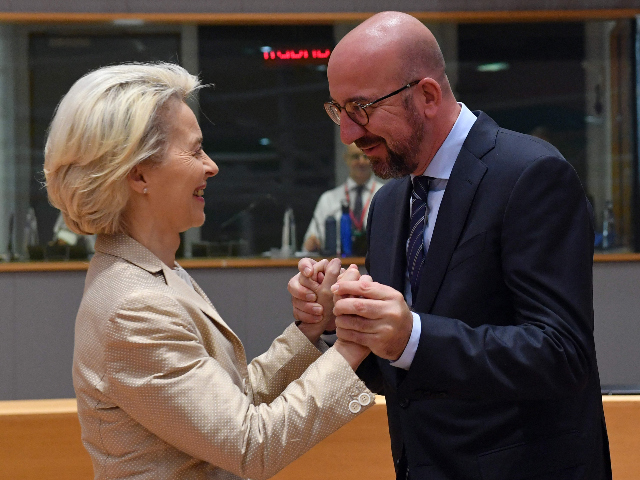The European Union has come to a compromise that will place an embargo on two thirds of Russian oil immediately with the aims of reducing imports from Moscow by 90 per cent by the end of the year in the sixth round of sanctions set to be imposed by the bloc since the full-scale invasion of Ukraine in February.
Following tense negotiations with Eastern European nations such as Hungary, the EU agreed to limit the scope of its embargo to oil transported by sea, meaning that pipeline shipments of oil will be allowed to continue to countries such as Hungary, Slovakia and the Czech Republic via the Druzhba pipeline from Russia.
European Council President Charles Michel hailed the compromise as an example of “unity” within the bloc, claiming that the deal will immediately impact two thirds of oil imports from Russia, which he said will serve to cut a “huge source of financing for its war machine” and will place the “maximum pressure on Russia to end the war.”
The Belgian eurocrat said that the bloc will continue to reduce its dependence on Russian oil, claiming that by the end of the year 90 per cent of Russian oil will be banned from the EU, with pipeline exemptions once again being carved out for the aforementioned Eastern European nations. Germany and Poland, however, have committed to cutting off pipeline imports from Russia by the end of the year.
I am glad that tonight leaders agreed in principle on the sixth sanctions package. This is an important step forward.
We also agreed to work on a mechanism to provide Ukraine with a new, exceptional macro-financial assistance package of up to €9 billion. https://t.co/La3bZl6JNp
— Ursula von der Leyen (@vonderleyen) May 30, 2022
The deal reached in the early hours of Tuesday morning will also include an additional €9 billion (£7.6 billion) in aid to Ukraine, as well as removing Russia’s largest bank, Sbrebank, from the international Swift payment system and banning another three Russian broadcasters from the EU.
According to the EU-funded news website Euractiv, the 27 member states of the bloc have sent a total of €56.5 billion in energy payments since the February invasion of Ukraine, nearly €30 billion of which was sent to Moscow in exchange for crude oil.
At present, Russia supplies around 27 per cent of all oil imported into the EU and 40 per cent of its gas. The latest round of sanctions will likely see oil prices continue to rise, with the price per barrel hitting $121 even prior to the announcement of an EU embargo, which further threatens to increase the economic woes facing citizens who are already struggling with an inflation crisis. The oil embargo also comes amid warnings of energy rationing throughout the bloc.
European Union Preps for Gas Rationing over Russian Shutdown Fears https://t.co/xxRIlIyvKW
— Breitbart London (@BreitbartLondon) May 27, 2022
While Brussels had initially hoped that it could come to an agreement to cut off all oil supplies from Russia by the end of the year, it was unable to overcome objections from Hungary, which receives around 65 per cent of its oil via Russian pipelines.
Following the compromise, Hungarian Prime Minister Viktor Orbán re-stated his assertion that a full oil embargo would be the metaphorical equivalent to dropping a “nuclear bomb” on the Hungarian economy.
Orbán, who with his recent re-election now serves as one of the most senior leaders within the union, added: “It would have been unbearable for us to operate the Hungarian economy with the more expensive (non-Russian) oil… this would have amounted to an atomic bomb but we have managed to avoid that.”
Commenting on the deal, Estonian Prime Minister Kaja Kallas said: “It’s a fair compromise … this was the best we could get.”
Great Reset: EU ‘Needs’ Lockdown-like Restrictions to Curb Russian Oil Usehttps://t.co/89XBX3F8ge
— Breitbart London (@BreitbartLondon) May 19, 2022
After banning Russian coal, and now the majority of Russian oil, the European Union will likely look to try to end its reliance on Russian natural gas, however, this will pose a tougher challenge, with countries such as Germany lacking the infrastructure to import large quantities of liquid natural gas at its seaports.
Austria, which is also heavily reliant on Russian gas, has expressed that it would block a move from Brussels to ban natural gas from Russia in the planned seventh round of sanctions later this year, with Austrian Chancellor Karl Nehammer stating on Tuesday: “Gas can’t be part of next sanctions.”
Russia has already independently cut off some European countries from its gas supplies over President Vladimir Putin’s demand that “unfriendly” nations pay Moscow in rubles, including Poland and Finland.
On Monday, this was extended to the Netherlands, with Russia’s state-owned Gazprom announcing that it would cut off gas supplies over the refusal from Dutch gas company GasTerra to pay in Russian currency.
Progress? Germany Agrees Gas Deal with Sharia Qatar to Reduce Dependency on Russiahttps://t.co/RfxtIGVIhQ
— Breitbart London (@BreitbartLondon) March 21, 2022
Follow Kurt Zindulka on Twitter here @KurtZindulka

COMMENTS
Please let us know if you're having issues with commenting.